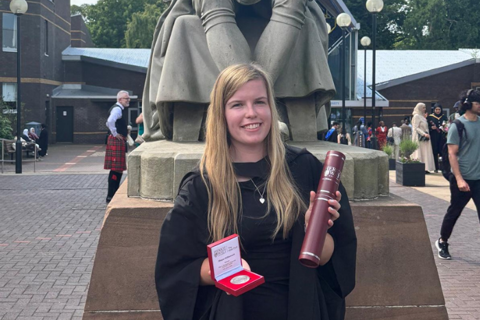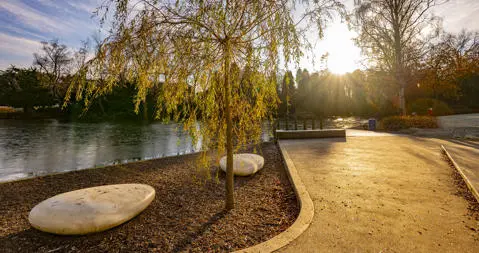Key information
Find out more about our 3 year honours degree option.
- UCAS code
- C110
- Level
- Undergraduate
- Delivery type
- Full Time
- Degree qualification
- BSc (Hons)
- Mode of delivery
- On-Campus
- Duration
- 3-4 years
- Location
- Edinburgh
- Start date
- September
This career-focused degree has specialist pathways in cell and molecular biology, human health, and microbiology, or an option to remain on a broad, interdisciplinary biological sciences programme. This offers the flexibility to decide which degree and pathway best suits your career ambitions and switch within the first two years should your interests change.
The undergraduate programme explores the fundamentals of modern environmental, plant, animal, and cell biology. You’ll experience a multidisciplinary teaching and learning approach, integrating concepts from biology, chemistry, and mathematics to help you develop a holistic understanding of living systems. You will gain a broad and balanced foundation of biological knowledge and practical skills and apply this to create solutions for theoretical and practical problems in biology. Throughout your studies, you’ll choose optional courses which best align with your biological interests, before choosing your specialist pathway in your third year.
You’ll learn the principles in all the main areas of biological sciences, including:
- Ecology
- Zoology
- Plant Science
- Microbiology
- Biochemistry
- Molecular biology
Biology has a significant impact on our daily lives. By studying biological sciences, you will gain an understanding of the complexities of biology, be able to apply your knowledge to other related disciplines, and address challenges such as:
- Climate change
- Biodiversity loss
- Emerging diseases
- Food science development
- Sustainable resource management
You’ll develop your critical thinking, analytical reasoning, and problem-solving skills. You’ll learn about scientific concepts, evaluate research findings, and present innovative solutions to complex biological problems using a range of media. You’ll work independently and collaboratively, and engage in group projects, scientific discussions, and research initiatives.
Hands-on laboratory work and practical field research is prominent throughout the degree, and you’ll have access to our state-of-the-art labs where you can put theoretical knowledge into practice. This will help you gain valuable skills in interpreting and analysing scientific data. Fieldwork also provides an opportunity for you to engage with real-world ecosystems.
As well as building your skills in biological sciences, you’ll develop sought after soft skills, such as problem-solving, communication, and practical presentation skills. You’ll also understand the vital role of a biologist across a range of professional fields including research and development, quality assurance, environmental monitoring, and public health.
This industry-focused degree will ensure you have the understanding, knowledge, skills, and personal qualities required to undertake a wide range of careers within the scientific or other employment sectors.
Your student experience
Your learning will be informed by the expertise of our research-active biologists and academics from the Institute of Life and Earth Sciences which sits within the School of Energy, Geoscience, Infrastructure and Society (EGIS).
EGIS is one of the United Kingdom’s leading institutions for multidisciplinary research and teaching in areas critical to economic development and societal equity. Our teams work closely and have links with industry, and experts are regularly invited as guest lecturers in most courses and advise on student research projects.
The Institute of Life and Earth Sciences is well known for its strong research focus in various areas of biological sciences. Research activities encompass both fundamental and applied research, addressing critical issues in the field and making significant contributions to scientific knowledge. This degree is aligned with our research objectives to advance our understanding of the natural world, address global challenges, and contribute to scientific advancements that benefit society.
Go Global
With Go Global, Heriot-Watt's global student programme, you can carry your studies to new places and experience new cultures, expanding your horizons on the way. You'll discover what it means to be a true global citizen and emerge prepared for wherever your career journey will take you.
Inter-Campus Transfer: Malaysia
Course content
September Intake - Edinburgh
Year 1
Mandatory September
- Shaping Tomorrow Together A
- Practical Skills in Biology
- Introductory Biology 1
- Mathematics for Scientists 1
Mandatory January
- Shaping Tomorrow Together B
- Biology Practical
- Introductory Biology 2
- Chemistry for the Life Sciences
Year 2
Mandatory September
- Metabolism in Human Nutrition
- Research Methods in Biology
Optional September
- Human Physiology
- Science and Exploitation of Plants
- Introduction to Psychology 1
- Management in a Global Context
- Employability and Professional Skills
Mandatory January
- Introduction to Microbiology
- Cell and Molecular Biology
Optional January
- The Biosphere
- Animal Biology
- Global Challenges 1
Year 3
Mandatory September
- Biology Advanced Laboratory Skills
Optional September
- Food Microbiology and Health
- Concepts in Beverage Science
- Marine and Coastal Geography
- Applied Studies in Human Health
- Pathobiology of Human Disease
- Practical Marine Biology
- Marine Biodiversity
- Introduction to Process Technology
- Biotechnology
- Fundamentals of Marketing
- Beverage Microbiology and Biochemistry
- Geology and Soil Properties
- Introduction to Pharmaceutical Chemistry
Mandatory January
- Global Research Skills
Optional January
- Marine Environmental Biology
- Molecular Biology
- Medical Microbiology
- Operations Management
- Fundamentals of Sport and Exercise Physiology
- Living Planet
- Global Environmental Change
- Principles of Drug Discovery & Development
- Biological Psychology
- Bioprocessing
Year 4
Mandatory September
- Honours Research Project - Execution
Optional September
- Scientific Management of Marine Environments
- Stressors and Sustainability
- Microorganisms in Human Health and Drug Discovery
- Advanced Molecular Microbiology
- Toxicology
- Receptor Signalling in Health and Disease
- Marine Biological Survey and Analysis
Mandatory January
- Honours Research Project - Dissemination
Optional January
- Aquatic Toxicology
- Immunology
- Marine Fisheries Biology
- Molecular Plant Health
- Human Diseases and Therapeutic Interventions for Biologists
- Management of Marine Protected Areas and Built Structures
- Genomics and Proteomics in Human Health
Disclaimer
The courses mentioned above may change between now and the time that you study. For more information, please view our Terms and Conditions.
Programme Video
Biology Video
Student testimonials

Megan's story
Biological Sciences BSc (Hons)
Not only has she achieved a First Class Honours in BSc Biological Sciences (Human Health), but she has also been awarded the Watt Club Medal and the Royal Society of Biology prize, as well as her dissertation receiving the highest mark in her class.See more
See moreI studied Biology with a focus on human disease and drug discovery. I chose this programme because I’ve always been interested in understanding how diseases work at a molecular level and how this knowledge can be used to develop new treatments. Heriot-Watt’s strong research environment and applied teaching approach really appealed to me.
Fees and funding
| Status | Fee |
|---|---|
| Scotland | Paid by SAAS |
| England / Wales / N Ireland / Rep of Ireland | £9,790 |
| International | £25,808 |
- Status: Your residency status is usually defined as the country where you have been ordinarily resident for the three years before the start of your course.
- International: 'International' includes applicants from European Union countries who do not hold Pre-Settled or Settled status in UK. (This does not include students from the Republic of Ireland - see above).
Scholarships and bursaries
Bursaries for students from England, Northern Ireland or Wales
In addition to government loans and grants towards the costs of fees and living costs, we are offering generous financial support to attract and support eligible undergraduate students from England, Northern Ireland or Wales:
- Heriot-Watt University Bursary (up to £3,100 per year)
Entry requirements
We have standard entry requirements for all of our courses that you will have to meet.
Year 1
Standard entry requirements
- Highers AABB (over two sittings). Must include one of the following science subjects achieved at B; (Human) Biology, Chemistry, Environmental Sciences, Maths, or Physics.
- A-Levels BBC. Must include one of the following science subjects achieved at B; (Human) Biology, Chemistry, Environmental Sciences, Maths, or Physics.
- International Baccalaureate 27 points. Must include one of the following science subjects achieved at Higher Level 5; Biology, Chemistry, Physics, Environmental Systems and Societies, or Maths.
- BTEC Extended Diploma DMM. Must be in a relevant science subject.
- HNC C in graded unit. Must be in a relevant science including science at SCQF level 6.
Please check that you meet our University-wide National 5/GCSE (or equivalent) English and Maths requirements.
Minimum entry requirements *
- Highers BBBC (over two sittings). Must include one of the following science subjects achieved at B; (Human) Biology, Chemistry, Environmental Sciences, Maths, or Physics.
- A-Levels BCC. Must include one of the following science subjects achieved at B; (Human) Biology, Chemistry, Environmental Sciences, Maths, or Physics.
- International Baccalaureate 27 points. Must include one of the following science subjects achieved at Higher Level 5; Biology, Chemistry, Physics, Environmental Systems and Societies, or Maths.
- BTEC Extended Diploma DMM. Must be in a relevant science subject.
- HNC C in graded unit. Must be in a relevant science including science at SCQF level 6.
* Minimum: under our Fair Access Policy, we will relax our standard entry requirements for some Scottish and Rest of UK status students depending on their circumstances. Our minimum requirements will apply if you:
- live in an area within the Scottish Index of Multiple Deprivation lowest 20% (SIMD20) or POLAR4 Quintile 1 regions (RUK)
- or are care experienced.
We can also make exceptions for some Scottish students with grades above minimum but below standard. Read more about our Minimum and standard entry requirements.
Year 2
- Advanced Highers BB including Biology, plus Higher AABB.
- A-Levels BBB including Biology / Human Biology.
- International Baccalaureate 32 points. Must include Biology at Higher Level 6.
- BTEC Extended Diploma DDM. Must be in a relevant science subject including Biology.
- HNC B in graded unit. HNC must include sufficient Biology at SCQF Level 6.
- HND BB in graded units. HND must include sufficient Biology at SCQF Level 6.
Year 3
- HND AB / BA in graded units. HND must include sufficient Biology and be in a relevant subject area, e.g. Biology / Applied Biology / Human Biology / Environmental Biology.
Additional information
- For all years, applications are welcomed from holders of non-school qualifications, mature candidates and overseas students.
- If you do not see your qualifications here please contact us at studywithus@hw.ac.uk
- For applicants studying HNC, HND or BTEC qualifications, when submitting your application please ensure you list in full all the units you are currently studying, as specific units (e.g. in Maths) may be required.
English language requirements
If your first language is not English, we'll need to see evidence of your English language ability.
The minimum English language requirement for entry to this programme is IELTS 6.0 (or equivalent) with no score lower than 5.5.
If you do not have IELTS 6.0, we offer a range of English language courses to help you meet the English language requirement for this programme prior to commencing your studies.
Please see our detailed English language requirements.
Why Heriot-Watt
We're the top university in Scotland for graduate outcomes which means that more of our graduates are employed or in postgraduate education than any other institution in the country and we ranked 5th in the UK.
We're also rated number one in the UK for CEO or MD roles, meaning more of our graduates go on to become CEOs or MDs than any other university in the whole of the UK. On top of that, we have beautiful campuses, across the globe, so you'll get a truly international education. Our Edinburgh Campus is home to Oriam, Scotland's National Sports Performance Centre combined with plenty of wellbeing resources, prioritising fitness and mental health for all students. Our Global Research Institutes look at solving real world issues such as climate change and saving our oceans as well as working on the next medical technological breakthrough and the future of AI and robots.
Employability
Work and study
Salary
Potential career paths
- Natural and social science professionals
- Science, engineering and technology associate professionals
- Business and public service associate professionals
Student life
Explore facilities, and chat to staff and students
Discover Uni course data
Discover Uni provides data on each university's degree courses across a range of measures including student satisfaction, graduate jobs and salaries.






